Greece's powerful far right party, Golden Dawn, is being repressed. This is a detailed account and analysis of the organisation and the actions of the Greek state which, after encouraging it, has now turned on it.

Golden Dawn (GD), as we knew it, is over. Their leader N. Michaloliakos is behind bars, along with other prominent members, while those who survived the first purge are facing added charges that emerged a few days after the first arrests. While this was happening, a number of their offices around Greece have closed down, the state funding they received has been stopped, and reports indicate that many of their members (ex or current) are forming lines outside the High Court to testify against the organization. These testimonies are used as key evidence in the legal proceedings, leading among other things to the finding of hidden weapons.Apparently more than 4,000 heavy weapons were found in containers belonging to a businessman, co-owner of the biggest selling newspaper Πρώτο Θέμα, alongside Nazi paraphernalia. This specific newspaper was one of the first mainstream papers to consistently white-wash Golden Dawn, presenting them as a philanthropist organisation. Now the tide has changed, they try desperately to win a seat in the antifa camp. Their most recent attempt was publishing, on their front page, a picture of Pavlos Fyssas, moments before he died, laying in the arms of his lover. The caption read: we will not forget fascism. Even if the legal case does not bring most of GD’s members to prison, the inside fighting is bound to create enough damage to forbid the Nazi party from continuing as it has.
This approach of the collapse of GD is not only based on an analysis of recent events. It is also based on a specific understanding of the nature of the State in the modern capitalist world, and its essentially democratic ideology. Democracy is a system of decision-making and of social relations ideal for the capitalist economy. It creates a subject stripped of any control over the means of production, but abstractly equal to the rule of law, bound by existing class, property and exploitation relations, a subject which exchanges its need to consume the means of survival with the ability to participate in deciding who will manage these relations. This is the form that capitalism finds more suitable for the continuation of accumulation and the creation of value, and democracy has proven that it has far more tools and elasticity, as part of its social structure, to recuperate struggles and threats to the capitalist order, than the brute force of fascist/totalitarian regimes who require no consensus for their rule. The power of capital does not depend on the brute force of Nazi thugs, nor does it require coercion to further the devaluation of proletarians – in Greece or elsewhere.
As Dauvé has said, everyone would prefer (if given a choice) to live in social-democratic Sweden than being hunted down by Pinochet’s torturers. The point is that the choice is not ours, and it definitely does not depend on a set of forms such as universal franchise, civil rights and the existence of a parliament, however much these forms are fetishised. For regardless of the contingent advance that the existence of such rights might allow, they leave the fundamental social relations of class exploitation intact.
The forces that kick started the persecution of Golden Dawn, were the very same ones that the antifa/Left scene has been accusing all along (and rightly so) of aiding and facilitating the spread of its racist and fascist policies and ideology. And it requires a leap into absurdity to maintain a position under which the same forces that produce and support such anti-social elements are seen as the ones that will save one from them. Yet, this is democracy.
Though far away from the historical and material realities of fascism and Nazism, the modern State will push the limits of parliamentarism to its absolute edges (as has been the case many times in Greece with austerity measures being voted in parliament in the form of Special Acts of Legislative Content The Constitution clearly states that these Acts should only be used in extreme circumstances, as for example when parliament has no time to convene, and they aim to surpass the delays caused by bureaucratic structures. All they require is a proposal by the appropriate minister and a signature from the President. Within 3 months they have to be voted by parliament, otherwise they are deemed invalid. The majority of the austerity measures forced by the Memorandum agreements have become law through these Acts.), it will extend the powers of the police in ways which resemble totalitarian regimes (redefining legality through the use of anti-terrorist legislation, the Patriot Act or the German Constitutional Police), it will practically justify the emergence of the notion of “State of Emergency” as a permanent feature of modern life etc., BUT, contrary to a common approach found in the Greek anarchist scene, fascism is not a central political choice of the State.
Having said that, in order to understand recent developments in Greece, one should provide a brief trajectory of the organisation (and the extreme right) in Greece, not only in order to properly place its ideological and practical activities, but also to understand the historical context during which Golden Dawn was both supported and suppressed. Hopefully this presentation will show, among other things, that rather than running the risk of being manipulated by the Nazis of Golden Dawn, the State itself has always manipulated the extreme right for its own benefit, ready to sacrifice it when the cost outweighs the benefits.
The dawn of Golden Dawn
Michaloliakos had from a young age created a name for himself in extreme right wing circles: he was arrested for the first time in July 1974 in a protest against Great Britain and its role in the Turkish invasion of Cyprus, again in 1976 for attacking journalists who were covering the funeral of two infamous torturers of the dictatorship (assassinated by November 17th), while in July 1978 he was arrested in relation to a number of bombings in Athens along with other prominent members of the extreme right. Though facing serious charges (being part of a terrorist organization, to start with), Michaloliakos only received a 13 months sentence, and reports of the time indicate that he entered into a deal with the authorities –in exchange for informing on his former comrades. A few years later, a document emerged in which Michaloliakos was shown to have been on the payroll of the Greek Secret Service (ΚΥΠ), and though the document might have been falsified, the accusation would make sense. If the secret service were looking for someone to fund, he would clearly be their man.
From the beginning, there was little doubt that Golden Dawn (initially the name of the magazine published by Michaloliakos) was openly Nazi.
Cover of GD magazine from 1987
Of course, its leader and members try to deny the obvious, or at best claim that they only held such beliefs in their youth, but the Nazi references remained at the forefront of GD’s propaganda at least until 2007.
Cover of GD magazine in 2007
Their reluctance to admit their adherence to Nazism went hand in hand with the rise from anonymity to a recognized political party in parliament. Even for the hardcore extreme right wing of Greece, aligning yourself with the Nazis who occupied Greece and were responsible for the deaths of thousands, is going a bit too far. It is understandable for a small group of thugs and their pre-linguistic mutterings, but it is hardly attractive material for a wide electoral base.
GD members saying hello to their leader
Notwithstanding, in the early years GD remained a rather obscure and insignificant racket and the only people who knew of their existence were the anarchist/antifa scene, many of whom have had a lot of street fights with its members, some of whom now appear in parliament with their suits and their ties.
The first instance when GD crept out of its anonymity was during the early 1990’s, following the protests against Macedonia, a time when nationalism was a la mode, with the government openly sponsoring demonstrations to back up its nationalistic discourse and political agenda. Around the same period, and during the civil war in former Yugoslavia, members of GD enlisted as volunteers and fought alongside Serb fascists, proudly admitting their participation in the slaughter of Srebrenica.
Greek paramilitary volunteers give a friendly salute in Bosnia
In the early 2000’s, GD attempted to merge with other nationalist elements, a journey which ended in the creation of the “Patriotic Alliance” party, and at that time Michaloliakos announced the end of activities for Golden Dawn. In 2007 however, and in what was probably inner bitter fighting, the Patriotic Alliance dissolved and GD resumed its activities by holding its 6th conference.
In 2008, GD reached the headlines once again. An antifa counter-demonstration was attacked by a joint force of riot police and GD members, resulting in the stabbing of two people in broad daylight in the centre of Athens. The images of the Nazis side-by-side with the riot cops reached the headlines of the mainstream press, and questions were raised (soon to be forgotten) about the collaboration between the police and Nazis. (video here)
GD members hand in hand with riot cops.
A few months later, GD members staged a demonstration against immigrants who had occupied and were living in an abandoned building in the centre of Athens. At the end of the demonstration, Nazis together with riot cops laid siege to the building and attacked the immigrants and lefties who were inside. The left attempted to calm the situation down (urging the immigrants to refrain from answering the attacks), but a battle erupted. (video link here.)
Any resemblance between the circled ape (above) and the arrested GD deputy I. Panagiotaros (below) is purely coincidental and clearly a result of left-wing propaganda.
A new dawn?
In 2009, GD starts to work its way in the area of Agios Panteleimonas, a poor neighbourhood in the centre of Athens, which is a transit area for immigrants since the beginning of the 2000’s. Contrary to the Albanian immigrants who came to Greece in the early 1990’s, and have since been largely incorporated into Greek society (one should not of course forget the immense racism, police repression and workers’ exploitation that they endured for many years), the immigrants from Afghanistan, Pakistan and other countries that reach Ag. Panteleimonas do not see Greece as their destination point. Instead, Greece is seen as a transit destination for reaching other countries of Europe where prospects for a better life are much higher (if one manages to get there) than crisis-ridden Greece. This precarious situation defined their precarious existence in the streets of Athens.
Using the vehicle of s-called “Citizen’s Committees”, GD members and other extreme right wing elements fueled the dissatisfaction generated by immigration to promote racist and Nazi “solutions”. For example, from around 2009 onwards, a public playground for children was sealed by this “Citizens Committee”, with the excuse that it was being used as shelter by illegal immigrants (interesting videos here and here). And though the antifa/anarchist scene of Athens reacted to this racism by staging demonstrations, the lack of immediate connections with the neighbourhood as well as the repression of the police (in collaboration with the Nazis) did not allow this reaction to bear fruit. Mainstream media worsened the public image of the reactions, by placing anarchist trouble-makers on one side and concerned inhabitants on the other. Gaining ground, the “Citizens’ Committees” made various appearances in mainstream media where, and by using the façade of being a-political and non-aligned, they hid their GD allegiance.A good example is the case of Themis Skordeli, inhabitant of Ag. Panteleimonas who became infamous by numerous appearances on TV in which she abused immigrants while proclaiming herself to be a concerned citizen, not aligned to any political party (the blond woman in the videos here and here). The fact that she ran as a candidate for Golden Dawn in the elections of 2012 was apparently no contradiction. In September 2011, 2 Afghani immigrants were brutally assaulted and stabbed by a group of 15 people. Unable to ignore this, and after a demand by the Afghani ambassador, the police was forced to arrest suspects identified by the victims. Among them (surprise, surprise) was Skordeli who was subsequently charged with attempted murder (among other things). The court case has been postponed 8 times so far, due to Skordeli handing in a psychological evaluation which indicates that she is suffering from depression. Interestingly enough, the psychiatrist who signed Skordeli’s evaluation is the same one who signed psychological evaluations for a number of GD members, allowing them to legally carry weapons. Coincidentally, this same psychiatrist was also a candidate for Golden Dawn in the 2012 elections. During the repression of GD in the past few weeks, Skordeli was arrested and charged in relation to the case brought against the head of the police department of Agios Panteleimonas. This proud officer was involved, among other things, in the extortion of immigrants, who were “allowed” to sell their goods in the streets provided that they gave a cut of their money to him. When Skordeli was arrested, the police found a lot of products (that immigrants sell in the streets) and 145,000 euros in her house. Consequently, the “committees” organized pogroms against immigrants and attacked their shops, as well as assaulting left-wing candidates in their pre-election campaigns. All of these activities were done with the explicit knowledge, tolerance and (on occasions) participation of the police.
Before
After
Rise and fall of Th. Skordeli: Before: a simple angry inhabitant of Agios Panteleimonas. After: GD candidate, charged with attempted murder and the exploitation of immigrants.
Still, activities such as the violent dealing with immigrants in an environment of worsening economic and social conditions in Greece, brought GD to the foreground and landed them a seat in the municipality of Athens in the elections of 2010. Nikos Michaloliakos found the long-awaited public space to spur his poison.
Holding public office necessarily forced GD to tone down their Nazi sympathies,With the unavoidable exceptions of course: in a quarrel with left-winger P. Konstantinou at a municipal meeting, Michaloliakos gave him a Nazi salute, thus igniting further publicity that was, of course, soon forgotten along with the rest of the spectacle’s daily little scandals. urging them to explore new ways through which their racist and xenophobic propaganda could become more effective. And since open racism in Greece is not met with the same contempt as Nazism, GD managed to attract a considerable following both in the neighbourhood as well as nationally.
Michaloliakos fails to restrain his inner beliefs
In May 2011, a Greek man was killed after two immigrants tried to steal his camera in a street near Ag. Panteleimonas, giving GD the opportunity it was looking for. Exploiting the murder to the fullest, and spreading racist language, GD was at the forefront of organizing “vigils” that were soon turned into pogroms. Since these events were public, the police was always present, making sure that Nazis and other scum could perform their services unhindered by antifa groups who tried to organize against these developments. The result was a highly documented pogrom right in the centre of Athens, in which many immigrants were attacked and beaten in front of bewildered TV journalists. Of course, no arrests were ever made.
Though the official media condemned this expression of extreme violence, the undertone of the coverage was filtered with a “common-sense” approach, which proclaimed that, though misguided and “undemocratic” (sic), this violence was merely a response to the fact that there were too many immigrants in Greece and something should be done.
The development of the squares’ movement in Greece in the summer of 2011, straight after the pogrom days, overshadowed the racist expressions of GD and its sympathizers. GD was not an “anti-systemic” party at the time, you see, and it hastily condemned the mass demonstrations in Syntagma and elsewhere as expressions of anti-national, lefty propaganda. And contrary to a recent widespread myth that sees the re-emergence of racist attitudes as a result of the squares’ movement, GD and other extreme right wing groups refrained from joining the protests. Among other things, a sizable number of those participating in the squares had declared anti-racism as an underlying, unifying policy of the crowd (obviously as a reaction to the recent pogroms), and instances of any racial violence were extremely limited (although it is worth noting that the presence of immigrants was also very limited in these protests). At the same time, national flags and an underlying understanding of the crisis as a threat to national sovereignty were of course present. But, before turning one’s attention to extreme right wing groups or GD, it would be less hypocritical to take a look at the national discourse of the Left itself.As well as tendencies within the anarchist/radical scene. When the crisis is blamed on «supra-national elites», when the interference of Germany in the Troika is used as an excuse to call Greece an «occupied territory», when resistance to capitalist austerity is understood as a revival of the patriotic/Stalinist EAM-ELAS, it is borderline fetishistic to oppose the national flag or discourse which was proudly used in all the «past glories» this approach favours.
However, and though one could write books about the patriotic nature of the Left in Greece, their official line has always been pro-immigrant –even though based on a mystifying moralistic/humanist outlook. To properly understand the re-emergence of racist policies and a nationalist understanding of the crisis, as well as the astonishing 7% that GD got in the elections of 2012, one needs to look somewhere else. And official State policies are a good place to start.
Back to the fatherland
The struggles against austerity in Greece had produced a situation which seriously threatened the continuation of the memorandum policies as well as strongly undermining politics as a legitimate source of consensus. Ranging from traditional general strikes and riots all the way to the squares’ movement and the forcible emergence of a new, devalued and occasionally subversive proletarian subject, these struggles had enforced major transformations in the political scene, literally unimagined a short period before.A good example would be the almost complete collapse of Pasok, the ruling party state mechanism of the last 30 years. Among other things, its decomposition demonstrated the tremendous elasticity of the modern democratic state which is perfectly willing to sacrifice its agents in face of the needs of continuing the re-structuring of the economy.
Yet, these struggles never managed to supersede their limitations, and the gap created in the theatre of political foreplay, was soon to be filled by a coalition government (with less actual consensus than any government in Greece of the last 40 years), and by the dichotomy of opposition between Syriza and Golden Dawn. Though entirely different in all respects, Syriza and Golden Dawn share one small detail in common: they represent forces which long for a return to the traditional (destroyed by developments of globalization) form of the Nation State. Either from a social-democratic viewpoint or an authoritarian fascist one, both these political tendencies aim at reviving the State to the function that it had served so well in the past: a structural mediation whose purpose is the protection of its citizens from the “abstract” forces of the global economy. Syriza sees the solution to the crisis in the form of nationalizations and the creation of jobs, whereas GD by way of the expulsion of all immigrants and the creation of prison camps for those who disagree. Both see the State as responsible for restoring national sovereignty vis-à-vis foreign lenders and institutions.
While observing the emergence and appeal of the national discourse, the State proved more up to date than the anachronisms of social-democracy and fascism. Contrary to these “relics of the past”, the role of the modern state is instead a twofold penal/repressive function and a re-definition of citizenship –and its opposite, i.e. immigration. And while the repressive mechanisms of the State were used effectively during the anti-austerity protests (one should not forget that it was the police which enforced the memorandum and not parliamentary procedures), the card of immigration as the locus point for the enforcement of societal consensus through fear was still unused. This was soon to change.
In April 2012, Ministers of Health and Public Order LoverdosLoverdos abandoned the sinking boat of Pasok in 2012 and created his own political party. In one of his interviews, he claimed that Golden Dawn was the only real social movement to have emerged in Greece after the end of the dictatorship. and Chrysochoidis staged a joint press conference, claiming that the collapse of the Health System in Greece is related to the free treatment of immigrants (and unrelated, of course, to drastic budget cuts). In this statement of pure racist ideology, they claimed that illegal immigrants are a hygienic bomb located in the urban centres waiting to explode. As an example to back up this delirium of official State racism, they “discovered” the existence of illegal immigrant prostitutes who engage in intentional unprotected sex with their clients, in an attempt to contaminate AIDS to them. A series of wildly publicized arrests were made, while the pictures of those arrested were shamelessly branded in the 8 o’clock news. Little did it matter that (as it was proven later) many of the women arrested in this modern nightmarish witch-hunt were neither immigrant, nor prostitutes, nor did they have AIDS. The seed was planted.
In the same period, the government announced the opening up of new (so-called) “hospitality centres” for the detention of illegal immigrants. Called “concentration camps” by the majority of those who reject them, these new structures were initially part of a proposal by Golden Dawn in its various suggestions about what to do with illegal immigration. Soon after the proposal was taken up by the government, GD started criticizing them, arguing that the existence of the detention centres was nothing but a burden of costs for the State and that the immigrants should instead be dealt in more cost-efficient ways –such as immediately expelling them or placing landmines in the Greek borders.
The State’s definition of hospitality.
Riding the wave of anti-immigrant rhetoric, current PM Samaras sprayed his pre-election campaign with promises to “re-occupy the cities from illegal immigrants” (video here), as well as promising to “put an end” to immigrant children (note: not illegal ones) “occupying” what should be “Greek” places in public kindergartens (video here). A few months later, GD would remind Samaras his pre-electoral promise and would demand the official registration of all immigrant children in kindergartens, a request that was swiftly obeyed by the Greek authorities at the request of parliament.
In coordinating the need of filling up the detention centres with illegal immigrants, the State announced in August 2012 the (euphemistically named) police operation “Hospitable Zeus”. This is the closest form we have yet of a state-sponsored pogrom, whose aim is to stop, search, intimidate and (if illegal) arrest thousands of immigrants from the streets. Though a continuing operation until this day, the official statistics published by the police itself clearly indicate that the propaganda of an uncontrolled influx of illegal immigration is (apart from racist) grossly exaggerated: out of the more than 90,000 people stopped and searched so far, less than 5,000 have been imprisoned in the camps (not all of which have been detained for lacking legal papers).Some further myths in terms of immigration also need to be dispelled. Firstly, the notion of a massive, uncontrollable influx is undermined by official statistics. Close to the spirit of State and racist propaganda, though the number of immigrants who enter Greece is widely publicised (though strongly suspicious, especially considering that border controllers get bonuses for every immigrant they register, a tactic which often means that they register the same immigrants more than once), their exodus from Greece is largely unreported, amongst other things because it is done through illegal trafficking. Yet, there are some ways to have some kind of measurement: if one accepts the official statistics service of the EU, Eurostat, close to two thirds of illegal immigration has Greece as the entry point to Europe. At the same time, the number of new entries in Europe’s other countries has increased in the last 2 years by approx. 300,000 a year. Given that 2/3 of these come to Europe through Greece, this strongly indicates that a great number of immigrants manage to escape «Greek hospitality», ending up in the other «paradises of the West». Recently, an official report published by Alpha Bank indicated that immigrants have contributed to a 1.5% increase of GDP, they have facilitated the introduction of women in the job market by taking over traditionally gender-based housework, while also reversing the demise of the countryside by residing in remote areas where work was needed.
Routine checks in the streets of Athens
After winning the elections in 2012, and in the process of consolidating its power in government and the hegemony of its ideology, government party New Democracy enriched its cabinet and close advisory groups by a motley crew of extreme right wing fanatics. This racket is largely responsible for a slanderous –and often ridiculousIn a meeting in Croatia in May 2013, Slavoj Zizek urged people in Greece to vote for Syriza and proposed to send to gulags those who did not. As a response, New Democracy’s «think-tank» came up with an official declaration, urging Syriza to admit that they wish to send «dissidents» to the gulags. It was the first time (unfortunately) that Syriza replied to such idiocy with some self-respect. «The depth of New Democracy’s ridiculousness is obviously bottomless.» –propaganda campaign against Syriza, for the promotion of anti-immigrant (and anti-gay) propaganda, as well as attempts to win back voters who turned towards Golden Dawn by mimicking their discourse and proclaiming GD as originating from the same “family”.
Though most members of this advisory group were largely unknown to the public, New Democracy has left no doubt in relation to its intentions and ideological sympathies. For example, in March 2013, Ioannis Kotoulas, a self-proclaimed historian, was given a position as advisor (for issues of immigration, of all things) in the Ministry of Interior. It was not long after that it surfaced that Kotoulas’ career as a “historian” consists of the publication of revisionist Nazi-friendly books that would surely be illegal in a number of European countries. Other members of New Democracy’s think-tank, with the imaginative name “Truth Team”, include G. Mouroutis (anti-left fanatic and social media junkie) and F. Kranidiotis (a fanatic extremist who argues that the Left is responsible for the erosion of Greek national identity, proudly proclaiming that the days of left-wing dominance are over and that the renewed Right, with the National Idea as a flag, is advancing rapidly). Moreover, and after the downfall of extreme right-wing party LAOS (which paid the electoral price of collaborating with the pro-memorandum coalition), two prominent members of LAOS jumped boat and landed in the New Democratic family.
The first one is Adonis Georgiadis, widely known in Greece for his “career” as a literally hysterical TV salesman of nationalist books (videos here and here) and a constant figure of ridicule in popular TV shows.
Adonis started his career as a TV salesman.
Less known to the general public are the actual political ideas behind this clown figure. While selling books on ancient Greece and anti-Semitic “studies” on TV, Georgiadis also had the time to raise a number of interesting issues in parliament. Here is a joyful selection:
“Anarchist gangs are roaming the streets of Athens on a daily basis, and are assassinating innocent Greek workers.” (May 10th 2010)
“Gay communities receive money from organizations belonging to the state, which means that the state is now funding homosexual propaganda.” (June 4th 2010)
“Groups of enraged Muslims have taken over the city centre and the Ministry of Public Order has no plan to deal with a potential coordinated uprising of these elements.” (June 6th 2010)
“Muslim women, illegal immigrants, are wandering around wearing the burka, an image that is not only insulting to the Greek-Christian civilization of our country and the aesthetics of Greek society, but also human dignity and should be outlawed.” (June 29th 2010)
“The situation is out of control. Illegal immigrants slaughter, rape and plunder Greeks. Extreme left-wingers burn down Athens and some people criticize the police.” (May 16th 2011)
“The government ensures the comfortable stay of illegal invaders in our country, with the creation of reception houses for illegal immigrants, which have heating, air conditioning, bed linen and even mirrors. It also ensures the feeding of illegal immigrants at the same time that Greek citizens are looking through the garbage for food.” (May 18th 2011)
“Illegal immigrants with diseases are wandering around the same streets as our healthy citizens.” (July 8th 2011)
“Our squares have been occupied by extremist Muslim elements.” (August 22nd 2011)
“Groups of armed Pakistanis kidnap dogs to use them as food.” (October 10th 2011)
“Immigrant rapists are protected by the authorities.” (August 20th 2012)
“Immigrants are the victims of racist attacks, but the state does not even check if the shop that was attacked was legal.” (September 19th 2012)
Regardless of the above positions (or perhaps exactly because of them), this person is today the Minister of Health, i.e. responsible for policies that literally destroy public health by a series of lay-offs, drastic budget cuts, hospital closures and other similar niceties.In September 2013, the Centre for Blood Transfusions sent out a memo to hospitals urging doctors and personnel to inform patients that the required medical checks of blood transfusions are no longer possible due to budget cuts. Patients who need blood transfusions must proceed “at their own risk”, said the document. In a recent interview with the BBC, and while discussing the developments with Golden Dawn, Georgiadis was confronted by the journalist in relation to his “past” as an extreme right wing politician. His answers are worth watching (video here).
The second important transfer from LAOS to New Democracy concerns the person of Makis Voridis. A fascist thug from a young age, he became in the early 80’s general secretary of the fascist group EPEN, a party created by imprisoned ex-dictator G. Papadopoulos, replacing the previous secretary, N. Michaloliakos (who went on to create Golden Dawn). In charge of a nationalist student society during his university years in the Law School of Athens, he was often involved in violent fights with leftists and anarchists.
Makis Voridis (centre) holding a hand-made axe during scuffles with anarchists. Commenting on the picture, Voridis admitted he was a mere right-wing activist.
In 1994 he created the party Greek Front, and appeared as a candidate in the elections with humiliating results. By 2005, and disillusioned by his complete insignificance, the Greek Front joined the LAOS party of G. Karatzaferis en masse. Retaining his identity as a nationalist (admitted publicly as recent as 2011), Voridis gained fame building a profile of an eloquent (he is a lawyer) yet hard-line far right politician. When LAOS joined the coalition government, Voridis was given the Ministry of Infrastructure, Transport and Networks. When LAOS decided to stop supporting the government, Voridis chose instead to stay in the Ministry and, after being expelled by LAOS, he formally joined New Democracy. In typical extreme right wing fashion, whenever confronted with his past, Voridis evades the question and claims youthful enthusiasm (in the same way that GD members hide their Nazi sympathies).
For many analysts, the preference of Samaras towards extreme right wing politicians and advisors is not simply a tactical move. Samaras was himself in charge of the infamous Rangers of the Peloponnese in his youth, a group of thugs belonging to the youth organization of New Democracy, responsible for a number of violent clashes and attacks against left-wingers, anarchists, striking workers and even Pasok members.
The Greek Far Right
The far right in Greece has a long history and support, one that is particularly visible in specific areas of Greece (especially in the Peloponnese). It was there that the infamous Security Squads (a paramilitary group that openly collaborated with the Nazis) were based and it is there that extreme right wing politics still find a loyal support group. Yet, and especially since the end of the dictatorship, the far right has been more or less assimilated in New Democracy.
One happy extreme right wing family: Hardliner New Democracy president Averof (centre), along with Samaras, Michaloliakos (cousin of GD leader), Manolakos (far right royalist), and other right-wing activists.
There have always been small extreme right wing/royalist parties in Greece, but their electoral success were epic failures and it was often the case that they were eventually incorporated by New Democracy. The cases of Voridis (former EPEN, Greek Front and LAOS) and of Georgiadis (LAOS) are the most recent examples of this trajectory.
Golden Dawn was the only extreme right wing political party that refrained from joining forces with New Democracy,Though some of its members have flirted with other far right parties. Indicative is the case of Panagiotaros who ran as a candidate for LAOS in the 2002 elections, though unsuccessfully. and judging from various comments by New Democracy politicians, it is possible that this collaboration was resisted on the basis of the open Nazism of Golden Dawn, a position not shared by new Democracy’s personalities (let alone their voters). At the same time, and leaving aside GD’s love for Hitler and other deranged criminals, New Democracy’s policies show that there exist important moments of political agreement between all these far right rackets.Former Golden Dawn member Kousoumvris wrote a book in which he «exposed» his former organisation, probably due to the fact that they sold him out when he was arrested and imprisoned for bank robbery. Leaving aside the useless banalities that Kousoumvris babbles about, an interesting aspect of the book is the moment he explains that GD’s funding often came from a «mainstream political party». We are tempted to conclude that he did not mean Syriza.
What is crucial in this expose concerns an elaboration on the electoral support of Golden Dawn, as it developed since 2012 onwards.At this point, it is important to dispel a rather popular myth. It was covered in the news that around 50% of the police force voted for Golden Dawn. Though the majority of cops in Greece are not famous for their progressive beliefs, is obvious that such a statistic is problematic, since policemen and women around Greece vote as anonymously as anyone else. What was actually measured were the percentages that GD got in specific areas, and in fact in those that the special forces of the police (riot units, motorized units) vote. It is clear that many policemen tolerated the nazis (evidence of their collaboration is as old as the civil war in Greece), and in many cases policemen were actually members of GD. But the real question is that this tolerance appears to have been more part of a widespread “turning an blind eye” policy of the state. When the state decided to get rid of GD, 25 policemen (so far) were also arrested (and some imprisoned), whereas many others have faced disciplinary procedures or forced transfers. It is clear that this is not a simple smoke screen; one has to understand that the State mechanism is not a structure that can be manipulated by ideological fascists. It is rather the other way round. If the state wishes to control the police, it can do so in an easy and costless way: fire some cops and the rest will shut up. And an analysis of its electoral base shows that the majority of its voters come from traditional New Democracy strongholds. Many analysts explain the sudden success of Golden Dawn with reference to LAOS (and the legitimisation of far right politics) and its electoral downfall following the participation in the pro-Memorandum government. Though there is an element of truth in this, this approach fails to comprehend that the far right in Greece did not have to wait for LAOS to become a more legitimate political force, but was rather largely represented by New Democracy.
In the breakdown of the electoral base of Golden Dawn it was shown that 4 out of 10 of its voters came from New Democracy, while most of them claimed that they chose Golden Dawn as a form of protest against the pro-Memorandum government in which New Democracy participates.
At the same time it is interesting to note that though in urban centres with a high level of immigration Golden Dawn received some of its highest percentages (an average of 12%), the overall electoral geography of GD shows signs of a clear historical continuity with the Greek right wing, pre- and post-dictatorship. For example, in the area of Lakonia, place of the second best electoral results for New Democracy, and one of the most traditionally important areas of right-wing support, was also the area where GD received its best results nationally.
The same goes for urban areas, where support for GD did not (as it has been claimed) receive the votes of former KKE (Stalinist) or Syriza voters, but instead benefited from the tri-chotomy of the Right, with votes being divided between New Democracy, the Independent Greeks and Golden Dawn.
It is clear that the success of Golden Dawn drew on the breakdown of the social cohesion of the Right (as it was embedded after the Second World War and after the dictatorship), representing the disaffection of the right wing voters to the politics of the Memorandum governments. And this is definitely something that New Democracy took clearly into account when deciding on the criminalization of GD, in an attempt to convince voters to return to the big family of the Greek Right.It is indicative that in its media campaign against Golden Dawn, the government over-exposes their Nazism. This strategy is clearly aiming at reminding far right supporters that right-wing extremism and nationalism is not compatible with support for the Nazis.
Golden Dawn in Parliament
We have seen that the greatest part of the electoral support for GD originated from traditionally right wing strongholds, and that GD’s voters claimed that their votes were a form of protest against the pro-Memorandum outlook of the Right in Greece. Building on this “anti-systemic” image, GD seems to have successfully convinced its voters and sympathizers that it actually represents a political force that resists the austerity measures. Of course, for anyone with a slight connection to common sense, GD’s political views would be enough to discredit such nonsense. However, a close look at GD’s actual performance while in parliament is fairly indicative of their understanding of “anti-austerity”.
To set the ideological tone, we can start by focusing on the exact reasons for which GD itself declares its opposition to the Memorandum policies. So, in July 2012, the opening session for parliament started out with Michaloliakos wishing success to the coalition government, “at least at an economic level”, soon to add (as an explanatory remark) the extent of its disagreement: “Ladies and Gentlemen, Members of Parliament, Golden Dawn is against the Memorandum for a few words and only: giving away of national sovereignty.” Later on, he demanded the increase of the budget for the Armed Forces, as well as the compulsory enlistment of men and women for the Army at 18.
In August 2012, Golden Dawn (along with Pasok and New Democracy) blocked the proposal for the creation of an investigative parliamentary committee around the privatization of Agrotiki Bank, citing as a (very anti-systemic) excuse the fact that some of Agrotiki Bank’s cadres were involved in scandals. Clearly, the way to “punish” corrupt bankers for GD is to privatize.
In September, while busy employing various family relatives in parliament, GD MP’s also found the time to show their support for Latsis, the wealthiest businessman of Greece. Latsis had decided that maintenance costs for his boat “Neraida” were too much for him and asked the State to take over such expenses. Panagiotaros will call this offer an “opportunity” for the State, adding that in fact the Greek State might not even be worthy of such gifts, as it has a habit of “destroying all similar donations”.
In the same month, GD’s Kasidiaris made a heart breaking speech about the necessity for the State to compensate all those whose fortunes had been destroyed by the massive riots that shook Athens on February 12th, 2012. Small detail that the damage that proved so unacceptable for Kasidiaris concerned banks and multinational offices. So on top of all the bailout money that banks had already received (and are still receiving), Golden Dawn was seriously concerned with providing them with even more cash in order to replace their broken windows and their damaged ATM’s. On the same speech, he demanded that the bosses’ insurance coverage of employees should be decreased.
When in October 2012 shipyard workers invaded the Ministry of Defence, demanding that their wages of the past months should be immediately paid, Golden Dawn was deplored by the image, claiming that it was nothing but a disgrace of the Armed Forces they are so fond of.
But perhaps the most revealing instance for Golden Dawn’s “anti-systemic” credentials concerns the long-standing love affair with ship-owning capital. The shipping industry, one of the most prominent sources of capital accumulation in Greece, apart from providing its workers with minimal wages and devastating work conditions, enjoys 58 tax exemptions. When in November 2012 the government made a modest proposal for the ship-owning capitalists to proceed to a “voluntary contribution” of 80 million euros to the state by amending the taxation system, Golden Dawn went on a rampage. Former death metal bassist and anti-semite Golden Dawn MP G. Germenis, had a momentary lapse of his usual pre-linguistic screams, and argued eloquently against the proposal: “The business world is suffering. The shipping industry has repeatedly supported the Greek economy in the past, but [your proposal] seeks to decisively destroy it”.
A traditional stronghold of Stalinist KKE, the shipyard has seen a number of strikes led by the KKE-dominated union, fighting against existing and proposed conditions. These strikes have long troubled the shipping capital, eager to find ways to undermine this militant union.The Union is militant both inside and outside the shipyard. The secretary of the Metal Union of Piraeus was a prominent figure in the clashes that broke out in Syntagma square, during the 48h general strike of October 2012, when KKE decided to protect the parliament from the demonstrators. More recently, GD members were invited by a small number of nationalist workers in the shipyard, who urged them to take matters into their own hand and kick the Stalinists out. And even if one is tempted to understand Golden Dawn’s interference in the docks as an indication of their love for the Greek worker, one look at the video of the meeting is enough to convince where Golden Dawn’s allegiance lies. (link here). Keeping their promise, in September 2013, around 30 members of GD (apparently the same assault squad responsible for the assassination of Pavlos Fyssas some days later) attacked a group of KKE members while fly posting in Piraeus. At least 8 people were sent to hospital with head injuries.
Last but not least, it is worth mentioning another brilliant conception of GD’s political activity. This concerns the creation of job seeking offices (for Greeks only, of course), through which GD propagated its active concern for Greeks finding a decent job. Their main activity was to go around various businesses, factories and workplaces and urge the bosses to fire all immigrants working there (of course they did not do the same in the countryside, where farming is primarily done by extremely low-paid immigrants) and to hire Greeks instead –for the same wages that they gave to the immigrants.
Apart from their parliamentary work, GD made sure that it captured the attention of the public in a variety of extra-parliamentary activities. For example, members of GD stormed a street festival in Rafina and destroyed the benches of immigrant street sellers (after asking them for legal papers, yet regardless of the fact that many produced such documents). In June 2012, and after publicly announcing it, a group of 50 GD thugs attacked a house where 5 Egyptian fishermen were living, and the one Egyptian who did not manage to escape was sent to hospital with serious head injuries. In October 2012, Golden Dawn decided that the theatre play “Corpus Christi” was too insulting for their deep-rooted Christian beliefs, and alongside a group of raging Christian fundamentalists, they proceeded to lay siege to the theatre on its opening day, demanding the cancellation of the play. Golden Dawn’s MP Panagiotaros set the tone of the debate. (link here).
Golden Dawn’s MP Germenis performing Christian rituals.
At the same time they organized a few soup kitchensThese soup kitchens were clearly not as many or as often as GD (or the mainstream media which sympathetically covered them) would like people to believe. And it was often the case that they were never completed, either due to antifa demonstrations or simply because people refused to show up. (for Greeks only) and tried to portray themselves as a philanthropist organization,A famous case was when Πρώτο Θέμα published an article claiming that one of GD’s activities consists of protecting old people when getting money from the ATM’s. It was revealed later on that the only actual old lady that was interviewed and pictured in the article was the mother of a Golden Dawn candidate. which aimed at relieving Greeks from the hardships of the crisis. When not involved in such benevolent acts, they publicly proclaimed their enthusiasm for being allowed to carry guns legally, their allegiance to the dictatorship of 1967-1974 and their Nazi sympathies by inviting German Nazis for a walk around Greek parliament.
German Nazis getting a tour of Greek Parliament by Golden Dawn.
The assassination of Pavlos Fyssas
When on the night of September 18th, Pavlos Fyssas was brutally stabbed to death, the tolerance of the State towards Golden Dawn changed.Of course this was not the first time that Golden Dawn members assassinated someone. Sahzad Lukman, a 27 year old Pakistani, was assassinated by two members of Golden Dawn on January 19th 2013. Again, with the exceptions of radical and left groups and individuals, his murder left the majority of the population largely unaffected – apart from the obligatory expressions of horror and media-type condemnations. To be sure, this was not an immediate response. In fact, the day after the assassination, the government refrained from making any comments, and instead relied momentarily on the comments of far right New Democracy member Lazaridis, who downplayed the assassination and explained the “tragedy” using the famous “theory of two extremes”.This theory has an important historical background, but in Greece it was probably used for the first time in the early 60’s, by PM George Papandreou (grandfather of the recent Pasok Prime Minister). In his attempt to justify the persecution experienced by the Left, and in his willingness to gain the sympathy of the King, Papandreou proclaimed the dominance of «Freedom and the Law against the extremes». He added that «Surveillance of the activities of the far Left and the far Right along with their paramilitary organisations, does not indicate a police State. It is a national and democratic duty.» (link in Greek, here) More recently, this «theory» has been used to equate fascist practices with the violence – or sometimes simply the ideas – of the radical scene and/or the official Left.
Yet this strategy was not really successful. On the one hand, Pavlos Fyssas did not really fit this profile they tried to pin on him. A working class young man from Pireaus, and hip-hop artist, Fyssas was not politically active in any squat or group. He was of course antifa and critical of the existing system, but it became increasingly hard to present his murder in a light that would justify the “two extremes” position. On the other hand, the exposition of the conditions under which he was murdered left little to the imagination concerning police tolerance and complicity. Though the government tried to avoid such embarrassment, a variety of eyewitnesses testified on eager TV reporters that a police force was present during the assassination but did nothing to stop it. And if that was not enough, when the antifa demonstration of the next day in the area were Fyssas was killed was marked by clashes with the riot cops, videos were published in which Golden Dawn members, unhindered by the riot cops, attack the demonstrators. If the tolerance and “indifference” of the cops towards the Nazis was already known to all those willing to listen, now it was becoming common knowledge to a passive majority whose consensus towards the State is paramount. The outbreak of riots in many different cities of Greece on the same day was also an indication that the backlash from the assassination could easily get out of hand.
Thus on the second day after the murder, PM Samaras came out with an “antifa” statement that more or less proclaimed that “democracy has all the necessary legal tools to fight the descendants of the Nazis, but was lacking was the political will to do it”. On the same day, Minister of Order Dendias submitted a file numbering 32 criminal cases to the High Court (many of which were not even considered as GD-related even by radicals), thus commencing a legal procedure to get them tried as a criminal organization. The specific legal case might sound rather unclear, but the rationale behind it has to do with the fact that it is against the Constitution of Greece to ban a political party, especially since it has been approved by the High Court (which GD was). But, by accusing them of being a criminal organization, the law also allows a side-stepping of the immunity of members of parliament.
At the same time, the State began a thorough investigation into the assassination, and unblocked the privacy of mobile phones in order to establish a clear link between the assault squad that attacked Fyssas and the leadership of Golden Dawn. In the aftermath of the assassination, many former (or current) members of GD volunteered information about the group,This development is easy to understand. Though GD gathered and trained various thugs, ordering them around in numerous attacks, the common policy was that if anyone was arrested, Golden Dawn would deny any knowledge and any membership or affiliation. This strategy has a clear expiry date, especially when the serious clampdown on GD started. Feeling betrayed by the group, and obviously eager to protect themselves by making some kind of deal with the State, many members denounced their former allegiance and exposed GD irreversibly. And though at first Golden Dawn denounced these «witnesses» as fakes, they soon changed their language and spoke of «traitors». explaining that the organization was structured in such a way that nothing would ever happen unless the ones at the top (and especially the leader) knew about it. GD had a pyramid type structure, they added, separated into smaller units which were responsible for carrying out the attacks. These groups functioned in clear collaboration with many cops, who would either ignore them or even warn them of imminent searches. The group that assassinated Fyssas was among the most violent and prominent ones, being responsible – among other things – for the security of the party in all its public events. All this evidence was enough to built a strong case of Golden Dawn as a criminal organization, a charge which automatically means that the leader (and his second-in-command) face sentences of a minimum 10 years, even if no direct link between them and specific crimes are proven.
In the few following days, the whole spectacle of Golden Dawn was collapsing as quickly as former members booked appointments to get their fascist tattoos removed. Denouncing the whole prosecution as a plot designed by “foreign powers” (!), GD saw its appeal and credibility reach bottom. Little did it help when the official interrogations of the leading members became public. In these, from the leader to the last member, GD denounced … well, more or less, everything that they stood for. Even the most minor of their actions (such as destroying the benches of the immigrant street sellers in Rafina) was denounced as unnecessary, while they suddenly discovered a new found tolerance for immigrants, by claiming that their only problem was with illegal immigrants and not legal ones, forgetting (and hoping that others would forget as well) that the cornerstone of their expressed ideology was that there are no legal immigrants in Greece. This humiliating performance shook Golden Dawn even further, and (among other things) reducing seems to have reduced their support by as much as 50% (according to some polls) within a few days.
It is too early to estimate the exact outcome of the legal proceedings, but the way that the State is handling the case so far leaves little doubt that Golden Dawn will no longer be able to function as it has in the past, and definitely not with the same level of support (from the State among others). It is a logical assumption that many of GD’s leading members will see the inside of Greek prisons, an environment that will also become a future destination for many of its assault squads. The ongoing persecution of cops for assisting, tolerating or simply being complicit to Golden Dawn, also indicates that the State has decided that it will no longer accept the public endorsement of GD by its functionaries. In terms of the question whether these developments meant that immigrants are safer in Greece, the answer is unfortunately not. for while GD may have been discredited, and while the public acceptance of the most extreme form of racism has received a blow, it is obviously entirely mistaken to consider racism a Golden Dawn privilege (especially when racism has been so incorporated in the actual official policies of the State).
Nazi souvenirs and some of the weapons found in the house of businessman A. Pallis
Is the State antifa?
So, what could be the main reasons behind such a shift in policy from the State? How can one justify the fact this drastic transformation from a “turning a blind eye” policy (or openly endorsing Golden Dawn) to a persecution that is reminiscent (in legal terms, scope and propaganda) to the arrests of November 17th?
Firstly, one has to keep a wider picture in mind. With austerity entering its 4th consecutive year and the never-ending spectre of devaluation hanging over the majority of the population, the government seemed in need of a public display of force that would not turn the population against it. And though the left and radicals needed no convincing concerning the criminal nature of the Nazis, the silent majority who wishes to see itself as representing the sober middle ground of “realism”, was far too affected by the assassination and the world it uncovered for it to settle with a traditional mild approach. Of course the Nazis were useful idiots so far, providing the government with an a-la-carte alibi for democratic credentials, but their usefulness was never more important than the future of the government itself, whose above all responsibility consists of the continuation of austerity. The explosive situation that could have followed, had the government chosen to ignore the assassination as it had in similar cases in the past, was far too dangerous for the maintenance of social peace.
Golden Dawn did not attract the majority of its voters and support because it was Nazi or because it supported the dictatorship of Greece. The greatest support for Golden Dawn came because it legitimised racism; it provided crisis-ridden small-owners with a subject (immigrants) towards which they could direct their hatred (with no repercussions); it promised the re-emergence of a strong Nation State, which would protect its subjects from the economic hardships of the crisis. All these characteristics were particularly useful so long as austerity is not threatened, and Golden Dawn showed that it is a force to rely on at this level.So much so, in fact, that some of New Democracy’s “intellectuals” envisaged a possible electoral coalition with GD which could win them a strong majority in future electoral battlesA good example is pro-memorandum hack and frantic supporter of the government, B. Papadimitriou, who proclaimed in an interview before the assassination of Fyssas that New Democracy could surely imagine an electoral collaboration with a more serious (sic) Golden Dawn. This was further supported on the next day, in an article in which he said that «there is nothing shameful about nationalism». But the strengthening and development of Golden Dawn started undermining its usefulness. Following the assassination of Fyssas, and the direct links that could be established between GD and the police forces, the government feared that the repercussions could give birth to a new December in Greece, bringing thousands in the streets. By prosecuting Golden Dawn, the government indicated that it will take any measures necessary to ensure the continuation of normality (read: capitalist emmiseration) that harsh austerity brings, even to the degree of sacrificing a political party that they share so much in common with.
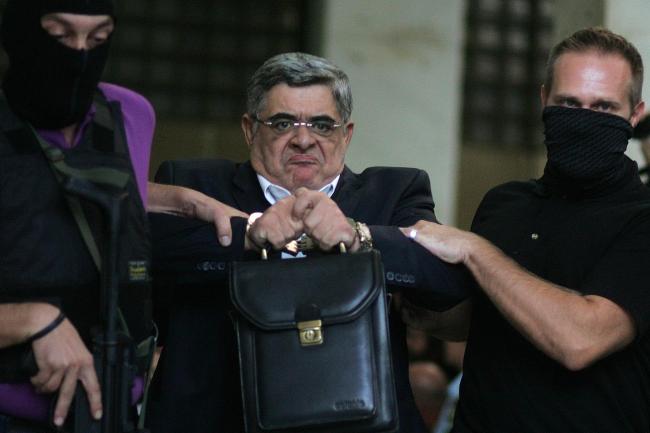

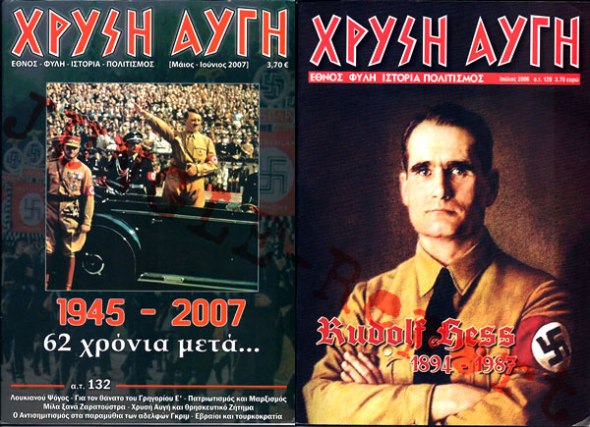


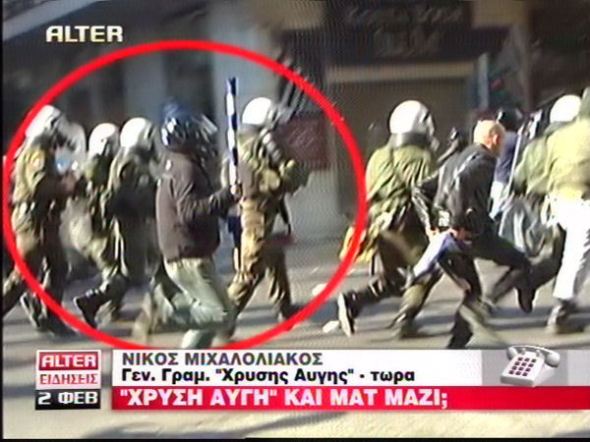
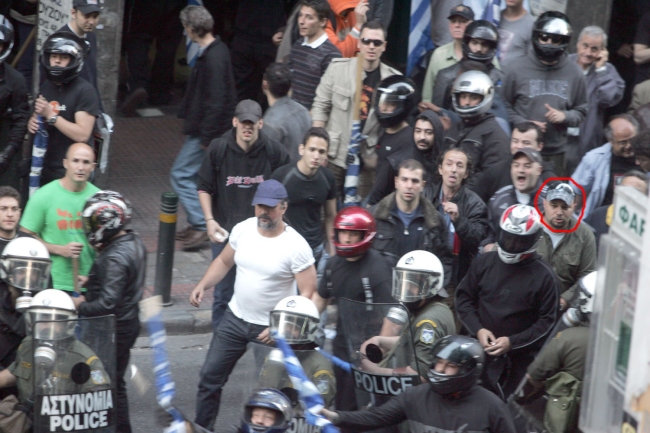

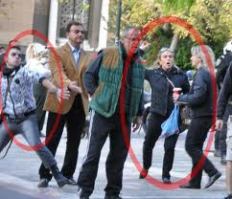

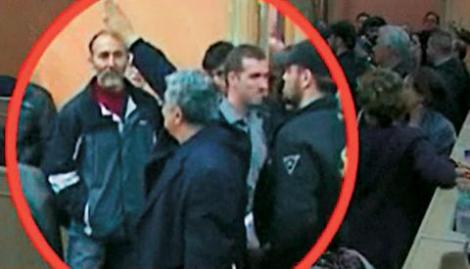
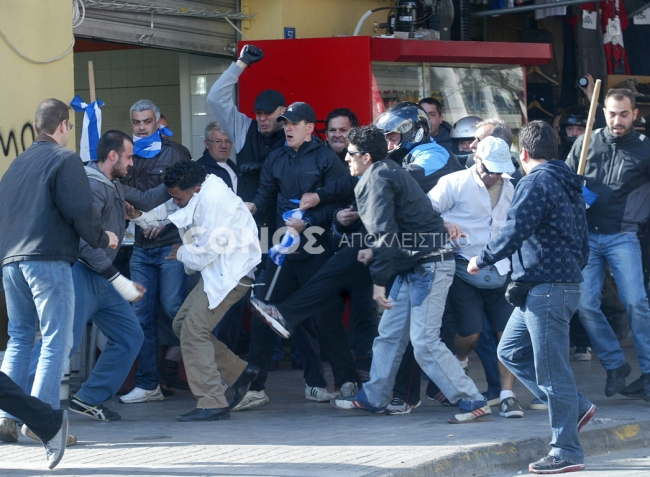

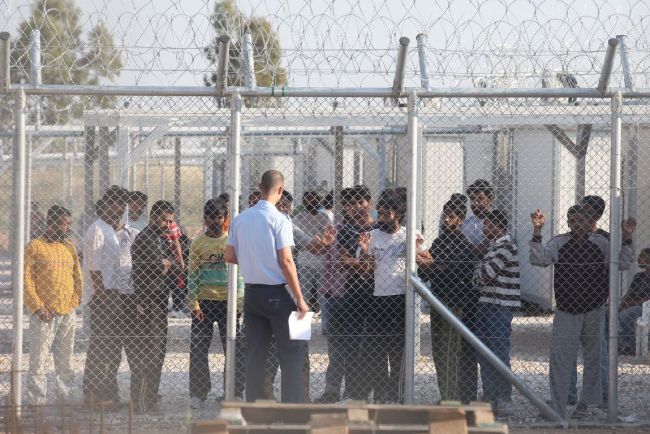

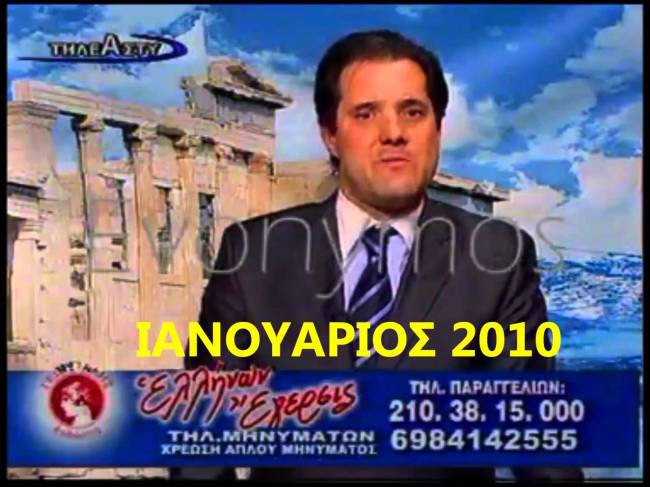
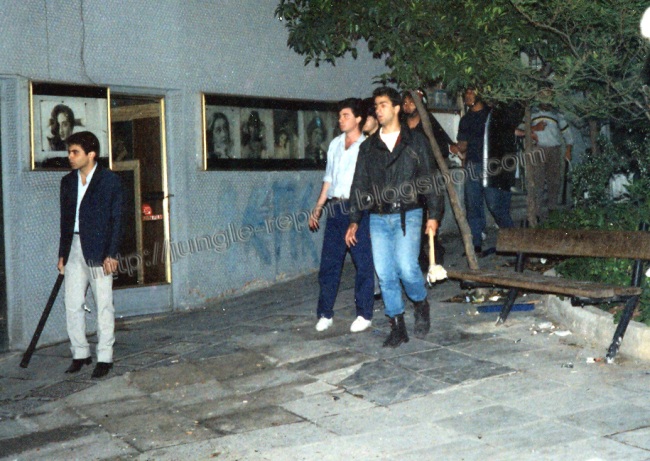


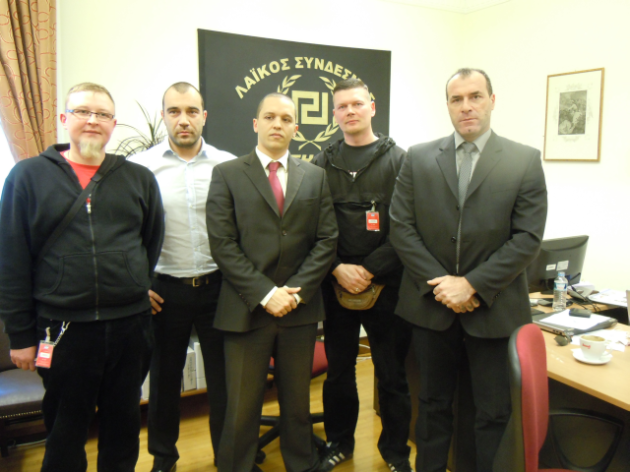
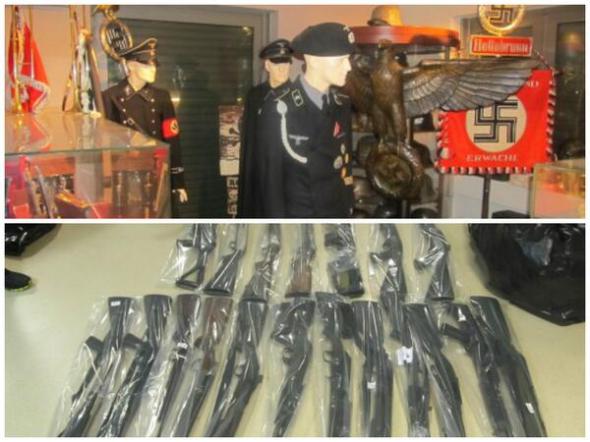






Comments
Here there is another similar
Here there is another similar article talking about Golden Dawn and the relations between state and fascism
http://eagainst.com/articles/the-fascist-threat-beyond-golden-dawn/